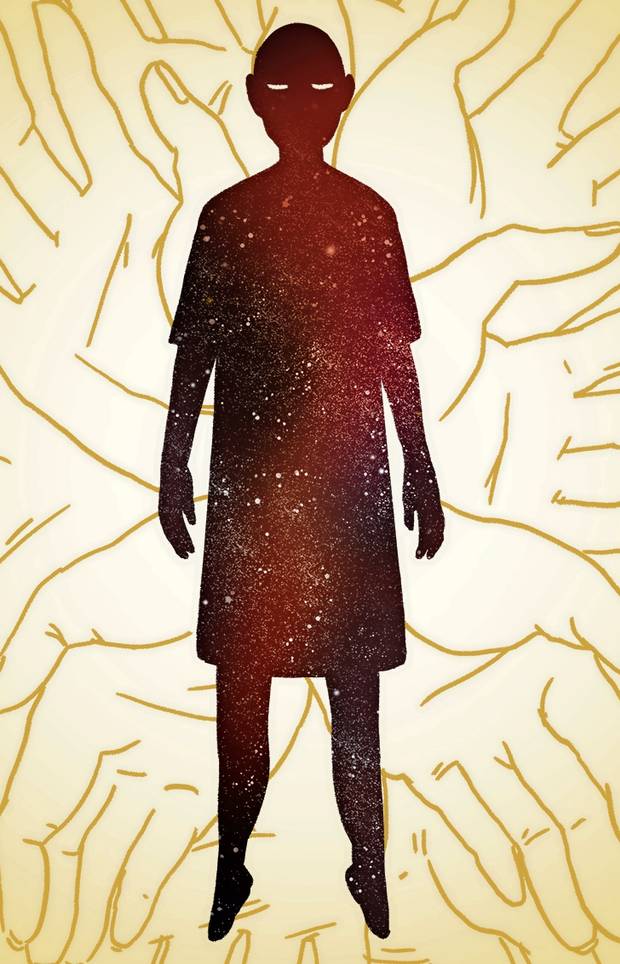I didn't know what to expect as I arrived at the coffee shop, about to host my first Death Café. Leading an informal discussion group on dying is not something I normally do on Saturday afternoon. Then again, becoming a "death doula," someone who offers support during the final stages of life, is not something I considered doing with my life.
I set myself up among cozy couches, welcoming each guest. Friends and former colleagues arrived, each with their own experiences with death. It solidified the obvious but underserved notion that death is the only part of life in which we are guaranteed to have a part. I wanted to help change how we think and talk about it. There's no best way to approach the toughest of conversations. Sometimes, people need someone to create the safe space. Then we just have to begin.

Irma Kniivila for The Globe and Mail
As everyone ordered tea, French fries, Diet Cokes, I spoke about my journey and education in the death sector and I encouraged them to jump in whenever something struck a chord.
Sheila shared her losses of loved ones with tears and thoughtfulness. She talked about how Irish traditions differed and often involved being present with death in the home, how mourning also involves laughter, joy and dancing. Others shared their losses, too, some with tears, some with laughter. While some simply listened empathetically. What we were creating in that coffee shop felt right – and needed.
My interest in death sparked to life in middle school when I found my mother, a home-care nurse, crying. Her six-year-old patient died of cancer that day. It was the first time I remember seeing my mom's tears. She was always the rock. I felt confused, awkward and intrigued, like I had invaded her privacy and witnessed something only adults should. I wanted to support her, but didn't know how. I didn't have the language or knowledge for what to say or do. Many of us don't at any age. I just remember feeling helpless.
Years later, when I was away at university, my Auntie Shirley's death illuminated the struggle loved ones navigate, not only in complex health-care systems, but in respecting a patient's wishes. My aunt opted out of extensive treatments that would prolong her suffering.
In the years following, I had dreams where she spoke to me. After each, I woke up feeling connected with her in a way I hadn't in life. And I wished she felt she could have turned to me and known that I supported her, whatever her choice. I wished I had shown up better as she prepared to die. And then, one work colleague, Barb, developed terminal cancer. She was intensely private and fairly isolated in later life. Bev, our chief executive officer, was Barb's primary caregiver. Bev pulled together a care team among us for everything from paying bills to maintaining Barb's manicures. Bev's leadership in how to prioritize and provide caregiving and community were priceless lessons: centre the person; be present with sadness, uncertainty and our feelings without judgment; maintain humour and self-care.
Ill people are often made invisible in our culture that has institutionalized sickness and created a maze of treatments and administration that can take away autonomy, humanity and connectedness. However, because of Bev, Barb blossomed by the love that surrounded her in her final months. I learned which kind of socks she preferred and discovered she had a crush on Tiger Woods. She told us stories. She was seen, heard and her wishes respected. Barb had finally let us into her life, only to now be leaving it.
When she died, a couple of us came to say goodbye.
We sat on a couch beside Barb's body. Bev was sorting through Barb's purse and the hospice nurse came in to say the doctor would be in. When the nurse left, Bev turned to Barb and said: "Great, she probably thinks 'Your body's not even cold yet and they're already stealing your things!' " We laughed through our tears. Laughter, anger, heartbreak, all happening together. It was beautiful.
Barb's death taught me how death should be supported.
Since then, I've discovered many organizations working to increase knowledge, choice and acceptance around death. They have educated me and taught me to be an ally in the same way the feminist movement has.
One end-of-life counsellor taught me many things, including active listening. Even during our intense sessions, Nino had the ability to laugh and transition from a moment appropriately. I came into training one day, and he asked how I was.
"Good!" I replied.
"Good. Fine. Great. Fine. Blah, blah but how are you really?" Nino pressed.
"Well, I have really bad cramps. How's that?"
He laughed.
Nino and others have inspired me and I'm now pursuing certification in thanatology and end-of-life care. As a feminist developing credentials in deathcare, I obviously love difficult but necessary conversations. These are things that matter.
After the Death Café, my friend Sheila thanked me for normalizing her grief. I was happy to be the conduit. Death isn't easy. It will never be something we get used to. People and experiences that profoundly change us can never be. But we can better prepare for it, and for each other.
Learning about death, I feel less fearful about my own, and it has profoundly changed the way I live my life.
Leigh Naturkach lives in Toronto.